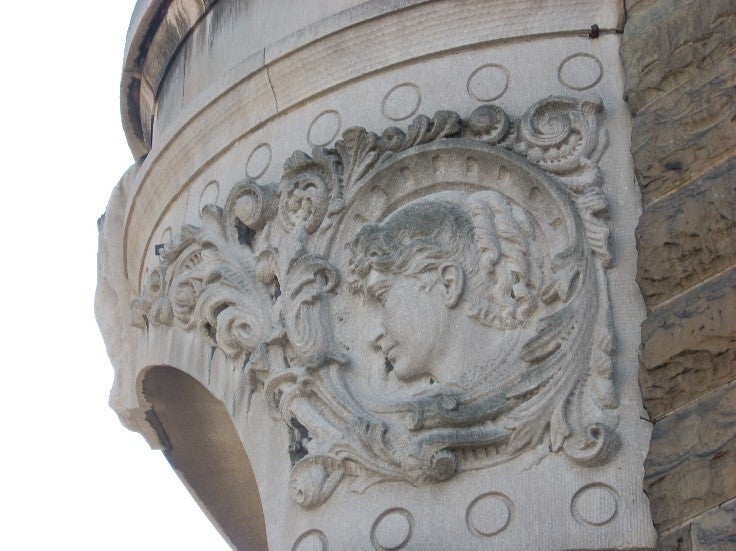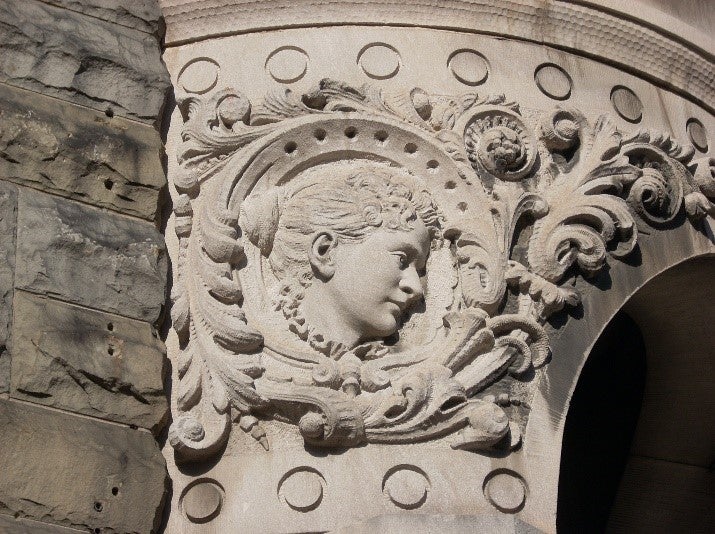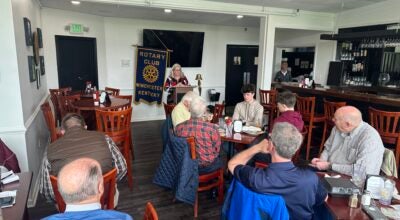WHERE IN THE WORLD? Citizens National Bank
Published 11:25 am Thursday, January 20, 2022
|
Getting your Trinity Audio player ready...
|
The Citizens National Bank building stands at the corner of Main and Court Street, where Eklektic Alchemy is today.
After the bank was erected in 1888, it was described as “decidedly the handsomest banking building in the State. It attracts the attention of all who come to Winchester.”
The Clark County Survey of Historic Sites (1979) touted the building’s architectural features: “The bank is a tour-de-force of stone work, mullioned windows, arched windows, elegant woodwork, iron balconies, decorated gables, and tall chimneys carried out in a vaguely Richardsonian manner.”
This local landmark lost much of its charm when, after years of deterioration, the third story, attic and tower were removed because of structural damage.
One intriguing feature remains: the two medallions flanking the stone corner entrance bearing the likeness of two young misses of the town in bas-relief. These were carved by John T. Rowe, a noted sculptor of the period. More on the girls later.
The Citizens National was Clark County’s second bank, chartered in 1874.
Thirty individuals provided the starting capital, with the largest shareholders being Wash Miller and J. D. Simpson. R. N. Winn served as the first president, and Simpson was the first cashier. These three men played a prominent role in the growth of Winchester between the Civil War and the turn of the century.
Dr. Washington Miller (1839-1910), though a physician, is better known for his business interests. He lived on South Main Street but had a county estate north of town where he raised shorthorn cattle. The estate, “Deerlawn,” was started by his father, Washington Miller Sr. Some sources state that Miller was the bank’s first president.
However, records show that he served as the second president, succeeding to that office in 1878. He married Susan Anderson, and they had four children.
Robert Nicholas Winn (1818-1901) was born in Winchester, the son of local farmer and businessman, Phillip B. Winn. Robert served as a deputy sheriff of Clark County, managed his father’s farm, worked in the dry goods store of his brother-in-law Henry G. Poston, then started a dry goods business with his brother William Winn. All this was before he entered the banking business during the Civil War, when he and J. D. Simpson formed the firm Winn, Simpson and Company. Robert married Mary Jane Brassfield, and they had four children. Robert died the day after his brother, Joshua N. Winn. Their double funeral featured two hearses and a double line of carriages that numbered 232 in all.
James D. Simpson (1845-1921) was the son of Winchester attorney and judge, James Simpson. J. D. Simpson followed his father into the law, taking his law degree at Harvard after attending Centre College. He soon abandoned the profession to enter the banking business with R. N. Winn. Simpson was the first cashier at Citizens National.
Following the death of Wash Miller, Simpson was elected president of the bank and was still serving in that capacity when he died. During his career, he also served as the first mayor of Winchester and president of the Winchester Cemetery Company from its founding. He built two showplace homes in Winchester and became one of the largest holders of real estate in the city. Simpson married Ella Taylor, the daughter of Dr. Hubbard Taylor.
Now, whose faces are portrayed on the two medallions? I have heard several opinions on this. The most reliable version, I believe, is a contemporary report which states, “The medallion faces over the entrance of the new Citizens Bank are Miss Lizzie Winn, daughter of Col. R. N. Winn, and Mary Miller, daughter of Dr. Wash Miller. It is a deserved compliment to two charming young ladies.” This appeared in a local newspaper the year after the bank was built. At that time, Mary Miller was 17 years old and Lizzie Winn was 33. Lizzie was still a single lady and was no doubt charmingbut young?
Citizens National Bank failed during the Great Depression, the result of insufficient assets. In October 1931, its directors voted to sell their assets, name and building to the Clark County National Bank.
Contributor Harry Enoch wrote this for the Winchester Sun.







